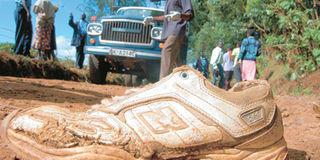Where did all the Mungiki go?

Photo/FILE
The aftermath of the Mungiki killings in Mathira. Photo/FILE
According to leading lights of the Mungiki sect that for years had Kenyans terrified at the mention of its name, the underground movement is no more — and looking for traces of it is like chasing a spectre.
The place of origin of the sect is Ng’arua, in Laikipia West, at Thiria village, the birthplace of the man originally known as John Maina Njenga, for years recognised as the Mungiki supremo.
An imposing metal gate leads into the homestead where it all began, founded, it is believed, by Njenga’s father, Mzee Kamunya wa Maina.
Said to have been a freedom fighter during Kenya’s struggle for independence, the old man is widely perceived to have been the patriarch and mentor of the sect.
In 2007, just before the last General Election, the mysterious Mungiki shrines still stood amid the serenity of the lush hills bordering Baringo, although they were abandoned and neglected, with the movement’s leaders on the run.
But today the family homestead is well maintained and surrounded by modern farming machinery that is used to run a top horticultural farm.
The 25 acres surrounding it are green, with a modern irrigation system and boreholes, producing varied produce that includes rose coco beans and quality tomatoes, among other crops.
Happily grazing around the farm are healthy goats, a few of which are slaughtered for Njenga’s visitors when he and his siblings are at home and receiving old buddies.
Is he still Mungiki, we ask a young lady rushing home to prepare the evening meal for her children. No, she said. Njenga is a changed man now, and the Mungiki people left this area long ago, to vanish into the towns and cities.
“We the women are the only ones left here, and we are braving our loneliness as we bring up the children alone. We are the unfortunate ones.
“If Maina Njenga were to stand for any position we would vote for him. He protected us during the ethnic clashes, otherwise we would not be here,” she said.
Popular wisdom has it that if there are still die-hard Mungiki adherents around today, they must be a far cry from the easy-to-identify snuff-sniffing dreadlocked members of yesteryear.
These were frightful characters wont to gather in well-known places for ostentatious rituals. One of those places was the Kanyuka dam at Karandi location in Ng’arua division of Laikipia West.
Today it is deserted, with no signs of the kind of Mungiki activities that once regularly took place there. So where have all the Mungiki followers gone?
“Many of them are still here,” a local resident said. “When things became too hot for them they strategically strongly disassociated themselves from Mungiki, shaved off their dreadlocks and changed their behaviour, and are today lying low, faceless.”
The man known as Kamunya Maina first moved to the Ol Arabel Settlement Scheme, where the family farm is still located, in 1969. He was given quite some acreage, most of it overgrown by 2007.
The old man had reportedly carried out farming there for many years, bringing up his three sons and several daughters. Two of those sons were Njenga and his older brother Njoroge Kamunya.
Njenga was for years universally recognised as the Mungiki national chairman, while Njoroge used to be the national organising secretary.
Little is known, even today, about their younger brother, while most of their sisters were married and moved to other homes.
One sister died years ago, and her children were by 2007 the only family members left in the Kamunya compound, where a woman employed as a maid looked after them.
Although nobody is able to say exactly when the Kamunya family began Mungiki activities, it is obvious that at one time the movement became practically family business, spearheaded by the elderly patriarch and his two sons.
“Whenever there were Mungiki gatherings around Karinde, the shopping centre would do booming business, as all food and drinks would be bought out,” a source at the centre explained, adding that during his heyday Njenga would arrive in expensive vehicles and hand out wads of cash.
“The man was extremely generous, and would not dish out anything less than Sh1,000.” Before Njenga became a hunted man he would be accompanied by two Scandinavian women, said to be researchers into African religions.
Locals clearly recalled that one of the women was particularly eccentric, having taken up some Mungiki habits, including sniffing snuff.
That was several years ago, before a crackdown on Mungiki was carried out in 2004, a year after an amnesty for members was announced by the then Internal Security minister, Dr Chris Murungaru.
Since then the known Mungiki leaders have been jailed, announced they have abandoned the sect or simply gone underground.




